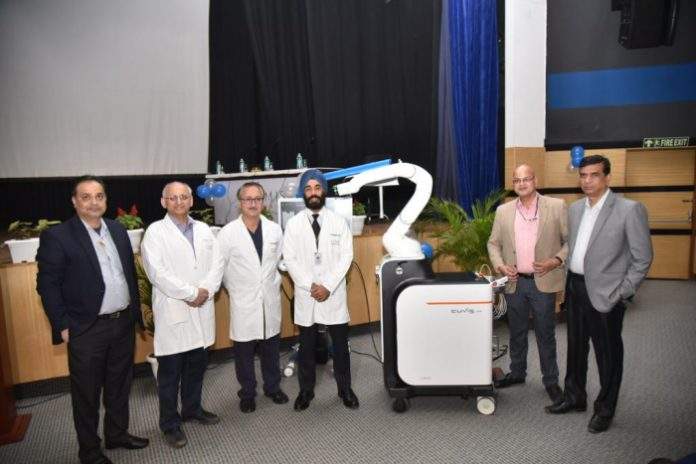The 600-bed Artemis Hospital in Gurugram, in Delhi-NCR, has installed a state-of-the-art CUVIS joint robotic system for knee replacement surgery.
The robotic technology from US-based Meril Life offers immense benefits for arthroplasty surgeries, compared to conventional methods, according to Artemis Hospital experts. These include pre-planning of surgery through personalized 3D CT imaging of bones, flexibility to change plans with a range of cutting options, sub-millimeter dimensional accuracy, and enhanced safety with bone-movement monitoring.
For patients, the advanced robotic system leads to better outcomes through more accurate implant placement, reduced risk of infection and injury, quicker recovery and less pain, and early discharge from the hospital. It offers the potential for better long-term function of the knee joint and enhanced implant survivorship and longevity.
In knee replacement surgery, the arthritic portion of the knee is removed and replaced by an artificial joint that forms the new surfaces of the knee joint. During Cuvis Joint Robot total knee replacement, surgeons use CT scans to build a 3D model of the patient’s knee. With that virtual model as a guide, they then use the robotic arm to make accurate bone cuts and insert the knee components precisely.
Dr IPS Oberoi, the chairperson of the Orthopedics Program and chief of Robotic Joint Replacement and Arthroscopy Surgery, said that knee replacement surgery with the robotic system offers significant advantages. “The precision with which the implant is put in the knee joint is much superior to the traditional method, even for severely damaged knees. In fact, the patient can walk within a couple of days after surgery. The robotic procedure is particularly suited for cardiac patients, as both knees can be operated upon at the same time, with fewer chances of complications. Knee implanted with robotic technology works well for 30 to 35 years, providing a life-long, carefree solution,” he said.
Oberoi added: “Such advanced robotic solutions have not arrived a moment too soon. Young knee arthritis is becoming a big concern today in India, with knee problems of older people increasingly afflicting those aged 45-50 years. Chronic Knee pain is a commonly seen complaint now due to conditions like arthritis, gout, and infections or injuries. Because of long years of neglect and apathy towards knee problems, more and more people are being advised of knee replacement surgery. Robotic surgery is a boon to such patients, with much better outcomes and quality of life.”
Apart from Oberoi, the team of doctors from Artemis Hospital present at the inauguration of the CUVIS Joint Robotic System included Dr Sanjay Sarup, head, Orthopedics (Unit II) & Chief pediatric Orthopedics & Spine surgery; Dr (Prof.) Ravi Sauhta, chief & HOD, Orthopedics & Joint Replacement (Unit VI); Dr Ramkinkar Jha, chief & Unit Head Orthopedics (unit III); Devendra S. Solanki, Head Orthopedics (Unit I), and Sandeep Chauhan, Head Orthopaedics (Unit III).









